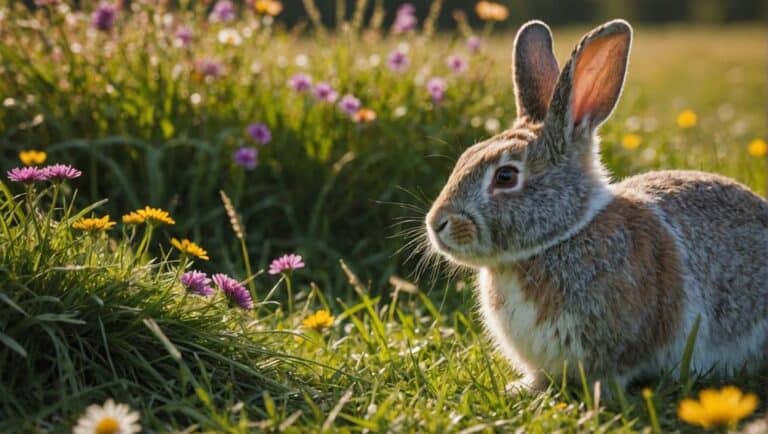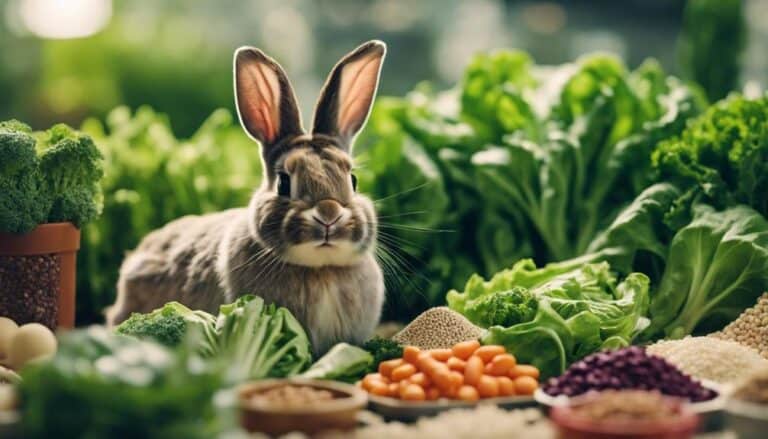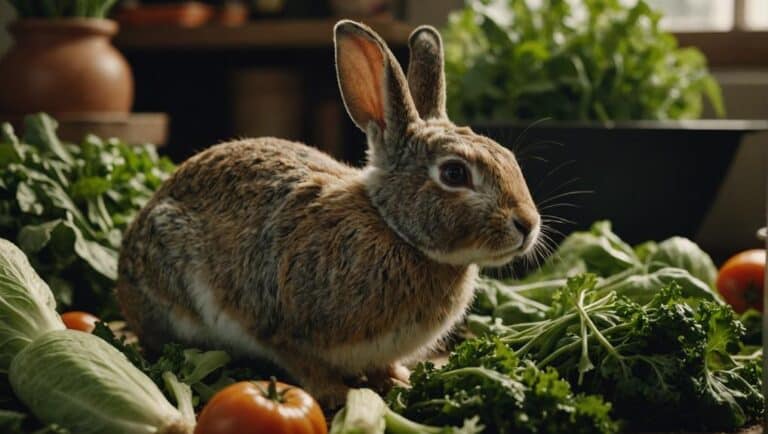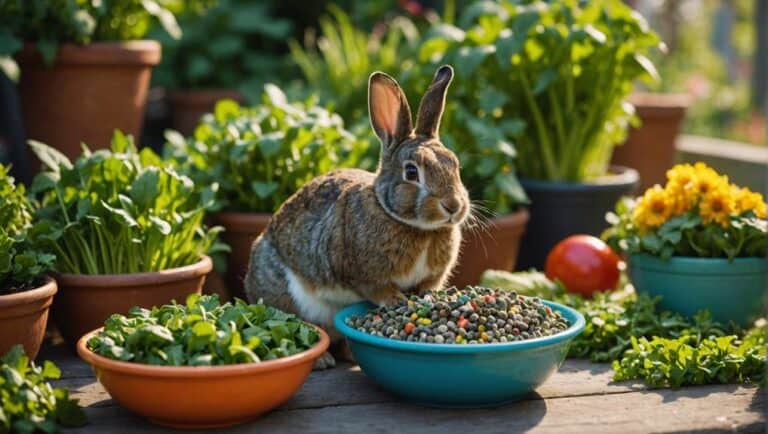Think of your rabbit's digestive system as a delicate garden, where every choice you make can either nurture or stifle its growth. You're likely aware that a balanced diet is vital, but have you considered the specific elements that contribute to ideal digestive health? By prioritizing certain foods and monitoring hydration, you can create an environment that fosters well-being. Let's explore a few essential tips that can make a significant difference in your rabbit's health journey.
Contents
Prioritize High-Quality Hay
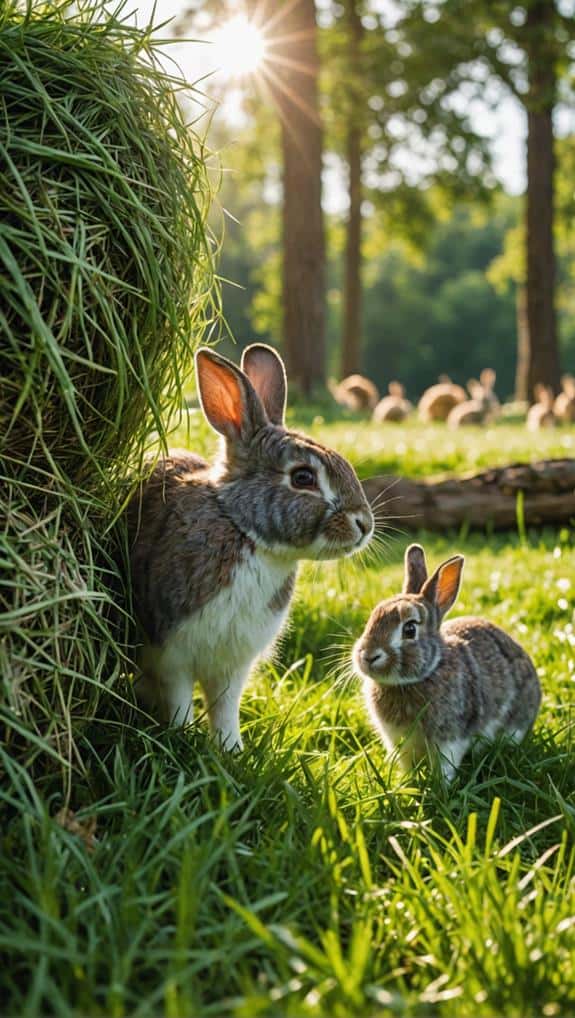
When it comes to your rabbit’s diet, prioritizing high-quality hay is essential for their digestive health. Hay is fundamental for managing weight through balanced nutrition while preventing boredom and ensuring a more enriched living environment. Additionally, incorporating a variety of grasses can keep your rabbit engaged and more likely to consume their hay. The hay benefits for rabbit digestion are significant, as it provides the necessary fiber that helps maintain a healthy gut and prevents common issues such as gastrointestinal stasis. Ensuring a fresh supply of hay at all times will not only support their digestive system but also contribute to their overall well-being and happiness.
Rabbits need hay to make up at least 80% of their diet, as it's rich in high fiber that promotes proper digestion. Timothy, Orchard, and Meadow hay are excellent choices, offering the necessary fiber to support gastrointestinal motility and dental health which is imperative for preventing dental issues.
Providing unlimited access to fresh hay throughout the day encourages continuous chewing, which is critical for the natural wear of their ever-growing teeth. Make sure the hay you offer is free from mold, dust, and contaminants to prevent respiratory and digestive issues.
Storing hay in a dry, ventilated area will help maintain its quality. Regularly monitor your rabbit's hay intake; a sudden decline in consumption could indicate underlying health issues that require veterinary attention.
Alongside hay, incorporating leafy greens can provide additional nutrients, but remember that hay should always be the primary component of their diet. By focusing on high-quality hay, you'll greatly contribute to your rabbit's overall health and well-being.
Ensure Constant Fresh Water
To keep your rabbit healthy, it's important to confirm they've constant access to fresh, clean water.
Water is crucial for sustaining blood circulation and aiding in digestion, which helps prevent gastrointestinal issues. Regularly check water sources for cleanliness and prevent freezing to maintain hydration.
Watch for signs of dehydration, as changes in water consumption can indicate health issues that need attention.
Importance of Hydration
Importance of Hydration (Guarantee Constant Fresh Water)
Hydration plays a vital role in your rabbit's digestive health, making access to fresh, clean water necessary at all times. Proper hydration supports the gastrointestinal tract and helps prevent digestive problems like gastrointestinal stasis, which can lead to severe complications if untreated.
Water is also key for regulating calcium levels and flushing out excess minerals, guaranteeing your rabbit's overall health remains ideal essential for sustaining blood circulation.
To guarantee your rabbit stays hydrated, consider the following tips:
- Monitor Water Intake: Adult rabbits usually drink 50-150 ml of water per kg of body weight daily. Keep track of their intake to spot any changes in health.
- Regularly Check Water Sources: Inspect water bowls or bottles to guarantee they're free of algae, debris, and freezing conditions, which can hinder your rabbit's ability to drink.
- Gradual Changes: If you need to change your rabbit's water source, do it slowly to avoid disrupting their digestive system.
- Encourage Drinking: Offer water in various forms, like bowls and bottles, to see what your rabbit prefers, guaranteeing they stay hydrated for ideal overall health.
Water Source Maintenance
Maintaining a reliable water source is key to ensuring your rabbit stays hydrated and healthy. Always provide constant access to fresh, clean water to prevent dehydration and gastrointestinal issues.
Studies indicate bunnies drink up to 3x more water when using bowls compared to bottles, which can considerably enhance their overall health natural drinking behaviors. It's essential to check water sources regularly, especially during extreme weather conditions, for any signs of algae growth or freezing. Change the water daily to keep it fresh.
Using a heavy, non-tip water bowl or a secure water bottle designed specifically for rabbits can help minimize spills and maintain cleanliness. Pay close attention to your rabbit's drinking habits; a notable decrease in water intake may indicate stress or underlying health problems that warrant veterinary attention.
To promote a healthy drinking environment, clean the water containers thoroughly at least once a week. This practice helps eliminate bacteria that could compromise your rabbit's health.
Signs of Dehydration
Recognizing the signs of dehydration is essential for your rabbit's health, as even mild cases can lead to serious digestive issues. Monitoring your rabbit's hydration can prevent gastrointestinal stasis and guarantee prime digestive health. Here are some key signs to watch for:
- Dry Mouth: A decreased saliva production indicates insufficient hydration.
- Lethargy: A sudden drop in energy levels can signal dehydration.
- Decreased Urine Production: Pay attention to litter box activity; less urine means less water consumption.
- Sunken Eyes: This visual cue often indicates that your rabbit is dehydrated.
Since rabbits require approximately 50-100 mL of water per kilogram of body weight daily, assuring consistent access to fresh water is critical for their digestive processes.
Always check their water for cleanliness and temperature to encourage regular drinking.
Regular observation of your rabbit's water consumption helps you detect any potential health issues early, promoting better hydration and supporting their overall digestive health.
Incorporate Leafy Greens Daily
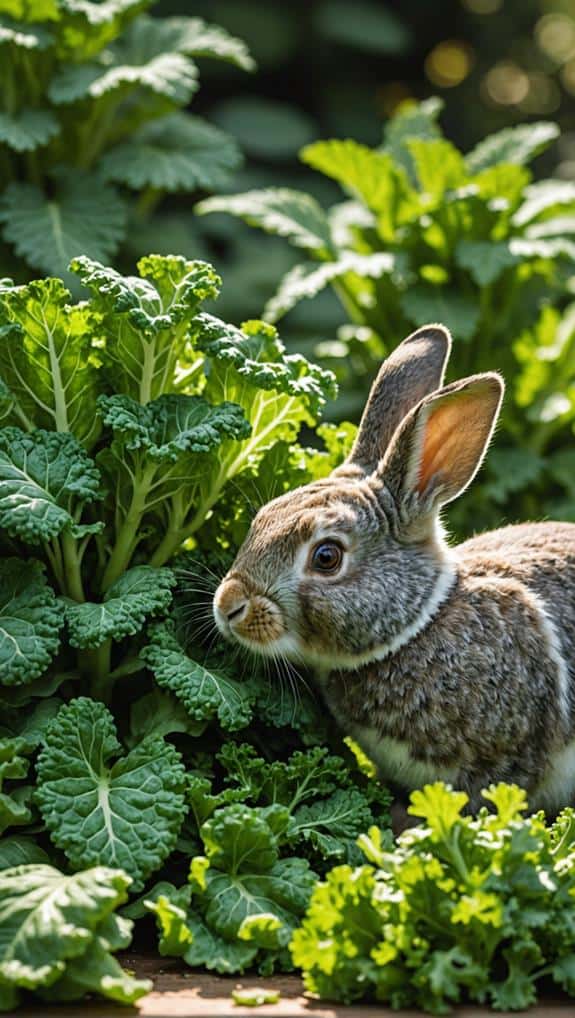
Incorporating leafy greens into your rabbit's daily diet is fundamental for their overall health and well-being. These greens provide essential vitamins, minerals, and fiber, all of which support a healthy digestive process. Recommended options include kale, parsley, and spinach, but it's important to introduce new leafy greens gradually to avoid digestive upsets. Always monitor your rabbit's response to verify they tolerate the new additions well.
Aim for approximately 1-2 cups of chopped leafy greens per rabbit each day, while balancing this with high-quality hay, which should be the primary component of their diet. A diverse mix of greens promotes a well-rounded intake, so feel free to experiment with different varieties, but steer clear of toxic plants. Always serve fresh and washed greens to confirm they're safe for your pet.
Leafy greens not only enhance your rabbit's digestive health but also play an essential role in dental care. Chewing on these greens helps wear down their continuously growing teeth, contributing to overall health and reducing the likelihood of dental issues.
Monitor Fiber Intake
To guarantee your rabbit thrives, monitoring fiber intake is vital for their digestive health. Fiber is essential for preventing gastrointestinal stasis and guaranteeing proper digestive function.
Here are some key steps to help you maintain peak fiber levels in your rabbit's diet:
- Prioritize Hay: Confirm that at least 85% of your rabbit's diet consists of high-quality hay or grass. This provides the necessary fiber for healthy digestion.
- Daily Consumption: Monitor your rabbit's daily hay consumption. Aim for the equivalent of one rabbit-sized bundle to verify they're getting enough fiber.
- Gradual Introductions: When introducing new fiber sources, like different types of hay or leafy greens, do so gradually. This will help avoid digestive issues.
- Assess Quality: Regularly check the texture and quality of the hay. It should be coarse and fresh to support both dental health and digestion.
Lastly, don't forget about hydration! Keep fresh, clean water available at all times, as it's essential for peak fiber digestion and helps prevent potential digestive issues.
Avoid Harmful Foods
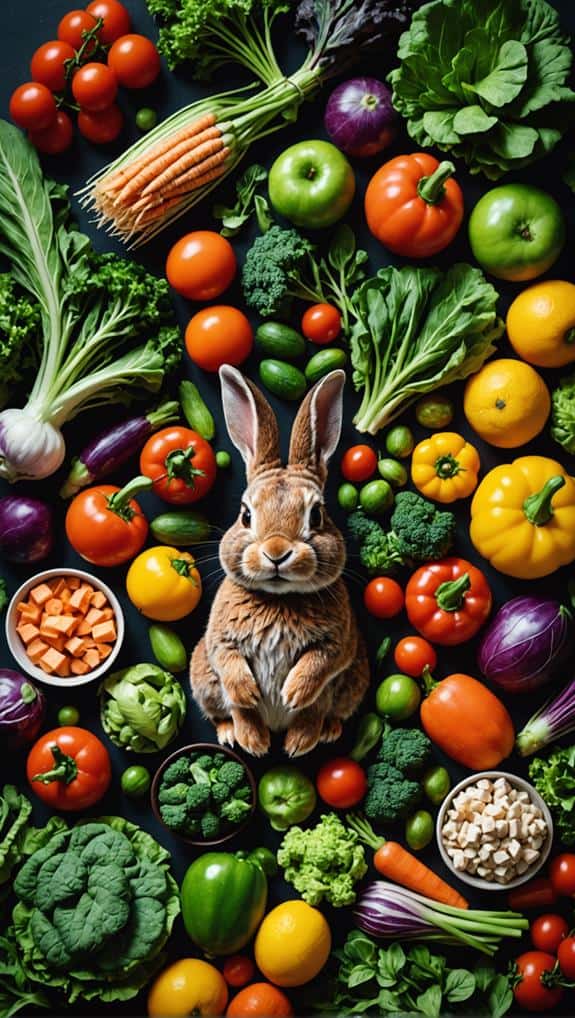
When caring for your rabbit, it's essential to avoid harmful foods that can disrupt their digestive health.
Stick to safe food choices and be aware of toxic plants that could pose serious risks.
Safe Food Choices
Choosing safe food options for your rabbit is vital for maintaining their digestive health and overall well-being. By carefully selecting what you feed them, you can help guarantee a happy and healthy rabbit.
Here are some safe food choices to take into account:
- High-Quality Pellets: Always opt for pellets specifically formulated for rabbits. These should be high in fiber and low in sugar to support their digestive system.
- Fresh Leafy Greens: Offer a variety of fresh leafy greens like romaine lettuce, cilantro, and kale. Introduce new greens gradually to avoid stomach upsets.
- Hay: Provide unlimited access to hay, which is important for their digestive health. Timothy hay or meadow hay are excellent choices.
- Limited Treats: While root vegetables and fruits can be given as occasional treats, limit them due to their high sugar content. Stick to small quantities to prevent obesity.
Toxic Plant Awareness
Understanding safe food choices is only part of ensuring your rabbit's health; awareness of toxic plants is equally important. Toxic plant awareness is vital for maintaining your rabbit's digestive system and overall well-being. Many common plants, such as foxglove, azaleas, and laurel, are harmful and can lead to severe health issues if ingested.
Even certain human foods like potato, onion, and chocolate are dangerous, so it's important to research anything before offering it to your rabbit. While some seemingly harmless plants, like dandelions and clover, can be safe in moderation, it's important to monitor their intake to avoid overconsumption.
Additionally, rabbits are particularly sensitive to toxins found in legumes, including chickpeas and beans, which can disrupt their digestive system and cause gastrointestinal distress. To keep things moving smoothly in your rabbit's gut, always maintain a list of known toxic plants.
Consulting your veterinarian will provide you with guidance on safe dietary options, ensuring your rabbit stays healthy and happy. By being vigilant about toxic plants, you'll help safeguard your rabbit's health and prevent unnecessary complications.
Regular Health Check-Ups
Regular health check-ups are vital for maintaining your rabbit's digestive health and overall well-being. Scheduling these visits at least once a year allows you to monitor your rabbit's health and catch potential digestive issues early.
Here are some key aspects to focus on during these check-ups:
- Dental Health: Your vet will assess your rabbit's teeth. Misaligned teeth can lead to feeding difficulties and cause digestive problems.
- Weight Monitoring: Regular weight checks help determine if dietary adjustments are necessary. Maintaining an ideal body condition is essential for preventing obesity, which can negatively impact digestion.
- Dropping Observation: During health visits, your vet can evaluate your rabbit's droppings. A consistent type and quantity of pellets indicate good digestive health.
- Tailored Dietary Recommendations: Consulting with your veterinarian can provide you with personalized dietary adjustments based on your rabbit's specific health needs, age, and lifestyle.
Observe Droppings Regularly
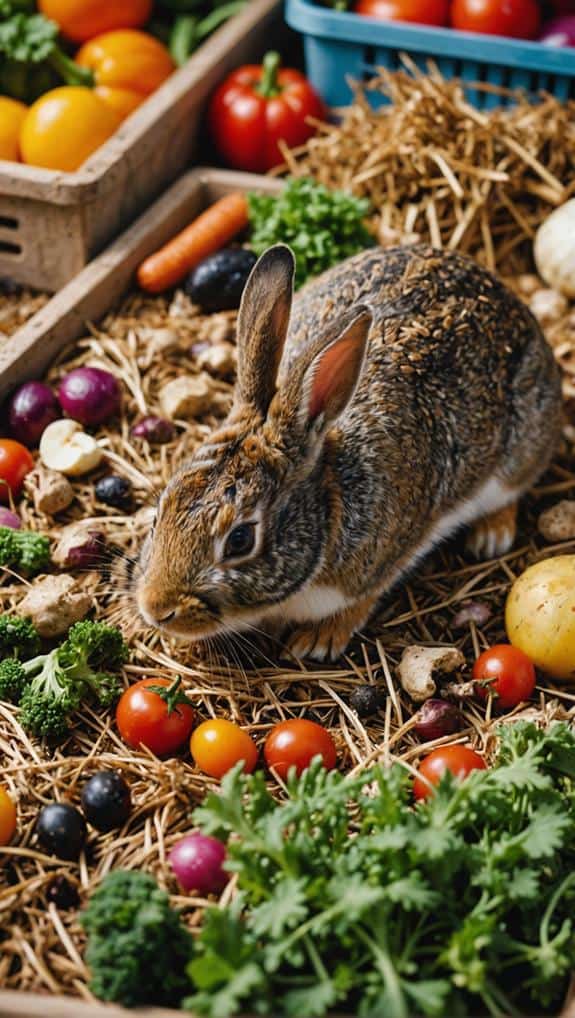
Monitoring your rabbit's droppings is crucial for evaluating its digestive health. Healthy rabbits produce two types of droppings: dry fecal pellets and cecotropes. By regularly observing droppings, you can better understand your rabbit's overall well-being.
Fecal pellets should be uniform in shape, firm, round, and glossy. These characteristics indicate a proper high-fiber diet and good digestion.
Cecotropes, which are softer and darker, provide important nutrients and are re-consumed by rabbits. A noticeable decrease in cecotropes can signal dietary or health issues, so pay close attention to these changes in droppings.
Any sudden alterations in the quantity, consistency, or appearance of your rabbit's droppings can be early indicators of gastrointestinal problems, requiring immediate veterinary attention.
Regularly cleaning your rabbit's living space not only guarantees a hygienic environment but also enhances your ability to observe droppings effectively.
Final Thoughts
By prioritizing high-quality hay, ensuring constant access to fresh water, and incorporating leafy greens, you're setting your rabbit up for digestive success. Don't forget to monitor fiber intake and avoid harmful foods to keep their tummy happy. Regular check-ups are key, and observing droppings can provide insight into their health. Remember, a healthy rabbit is a happy rabbit—just like a well-oiled machine, everything needs to run smoothly for peak performance!


